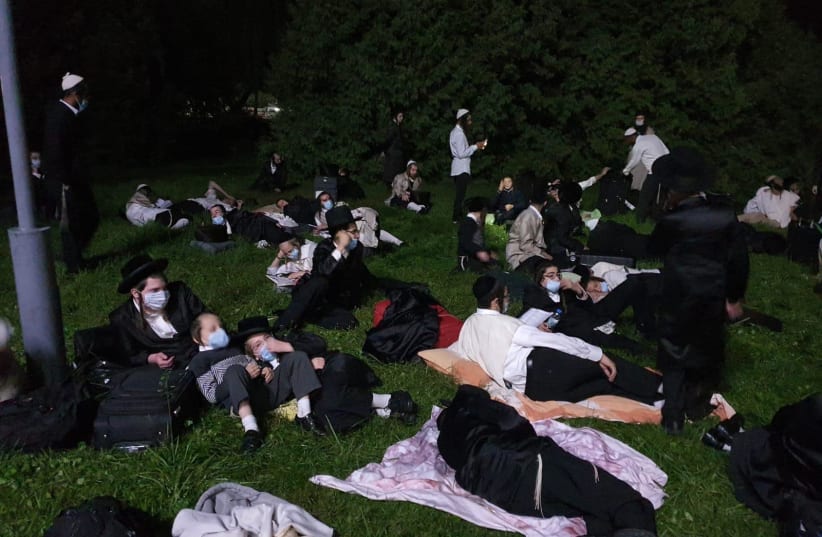Some 2,000 Breslov Hassidim and other Israelis seeking to make the annual pilgrimage to Uman, Ukraine, are stuck in Belarus, waiting in poor conditions to travel to the grave of Rebbe Nachman of Breslov.
The pilgrims traveled to Belarus hoping to gain entry to neighboring Ukraine despite Kiev’s ban on tourist visits that was imposed in late August.
According to Breslov organizers in Israel and some pilgrims in Belarus, many of those waiting have been stuck in various cities for two or three weeks. Some are sleeping in parks and streets.
Chaim Weitshandler, a Breslov hassid from Beitar Illit, told The Jerusalem Post he arrived in Belarus on September 6 and has been waiting ever since in the southern Belarus city of Gomel, close to the Ukrainian border.
Weitshandler said several hundred Breslov Hassidim and others in Gomel, including children and the elderly, have limited kosher food available other than fruits and vegetables. Many sleep outdoors and have no access to showers and other basic amenities. Some pilgrims are in Brest, Pinsk and Radin, closer to the border, while others are in the Belarus capital, Minsk.
Weitshandler railed against Prime Minister Benjamin Netanyahu, coronavirus commissioner Prof. Ronni Gamzu and Interior Minister Arye Deri for pressuring Ukraine to close its borders and for failing to assist those waiting to enter Ukraine now.
Health Minister Yuli Edelstein, Gamzu and others were all adamantly opposed to the annual mass pilgrimage of Breslov Hassidim and others to Uman for Rosh Hashanah, fearing it could create a mass outbreak of COVID-19 infections upon their return to Israel and among the local population in Uman.
Gamzu wrote to Ukraine President Volodymyr Zelensky about his concerns. Pilgrims could spread COVID-19 to the local population due to the high rate of infection among the haredi (ultra-Orthodox) community in Israel, he said. Haredi leaders and the broader community have said those comments were “antisemitic.”
Zelensky said Netanyahu spoke with him and recommended the pilgrimage be prevented this year.
Breslov leaders are currently in talks with Ukrainian officials to allow the 6,000 pilgrims to enter Uman. The Ukrainian government is examining the request but has yet to decide.
“We just want to pray,” Weitshandler said. “Who is the Jewish state to prevent this.”
“There can be anti-Netanyahu protests on Balfour [Street],” he said. “People can go off to spend time in Eilat, but praying is prohibited? Are these the actions of the Jewish state? What is Jewish about that?”
Asked if the Breslov Hassidim would try and cross the Ukrainian border without permission should authorization for the pilgrimage be denied, Weitshandler said: “Without any [other] options, people will try all possibilities.”
He cited comments by the principal disciple of Rebbe Nachman of Breslov, who said he would crawl to the rabbi’s grave for Rosh Hashanah even of swords were hanging over him.
Asked why the hassidim traveled to Belarus with Ukraine’s ban on foreign citizens in place, Weitshandler said they had believed it would be possible to enter regardless of the Ukrainian directives.
